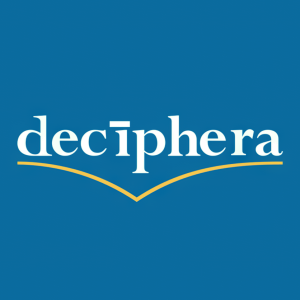Deciphera Presents Preclinical Data from DCC-3116 Program at the AACR-NCI-EORTC International Conference on Molecular Targets and Cancer Therapeutics
– DCC-3116 Shown to Inhibit EGFR and EGFR Family Inhibitor-induced Autophagy in Multiple EGFR-mutant Non-Small Cell
“The data presented today show that DCC-3116 inhibits the autophagy that develops as a resistance mechanism after treatment with EGFR inhibitors in multiple EGFR-mutant NSCLC cell lines and that DCC-3116 decreases tumor burden when combined with EGFR inhibitors. These findings are particularly important as EGFR is mutated in approximately
Results from the study, presented in a poster titled “DCC-3116, a first-in-class selective inhibitor of ULK1/2 kinases and autophagy, synergizes with EGFR inhibitors osimertinib and afatinib in NSCLC preclinical models” are summarized below. The poster presentation is available on-demand via the meeting website and on the Company’s website at www.deciphera.com/presentations-publications.
In Vitro Data Show Ability of DCC-3116 to Reduce Autophagy that Develops as a Resistance Mechanism after Treatment with EGFR Inhibitors in NSCLC Cell Lines
– EGFR inhibitors gefitinib, erlotinib and osimertinib, and the ErbB-family inhibitor, afatinib, activated autophagy three to four-fold over basal levels as measured by pATG13, a cellular substrate of autophagy-initiating kinases ULK1/2, in the EGFR exon 19-deleted HCC827 NSCLC cell line. DCC-3116, a potent inhibitor of ULK1 and ULK2, was shown to inhibit both basal and EGFR-induced phosphorylation of pATG13.
– Treatment of the EGFR T790M-mutated NSCLC cell line H1975 with osimertinib or afatinib, which inhibit the T790M mutation, induced autophagy three-fold over basal levels while treatment with gefitinib or erlotinib, which are not able to inhibit the T790M mutation, did not induce ULK-mediated ATG13 phosphorylation. DCC-3116 potently inhibited osimertinib and afatinib-induced phosphorylation of ATG13 and inhibited the increase in autophagosomes induced by these agents.
In
– The combination of DCC-3116 with osimertinib or afatinib resulted in significantly greater tumor responses than single agent treatments in the H1975 EGFR-mutant xenograft model.
The clinical development plan for DCC-3116 will initially focus on documented RAS and RAF cancer mutations, which utilize autophagy for tumor growth and survival. DCC-3116 is currently being investigated in a Phase 1, multicenter, open-label, first-in-human study designed to evaluate the safety, tolerability, clinical activity, pharmacokinetics, and pharmacodynamics of DCC-3116 as a single agent and in combination with trametinib, a commercially available MEK inhibitor, in patients with advanced or metastatic tumors with a mutant RAS or RAF gene. Following the dose escalation phase, combination expansion cohorts are currently planned in patients with advanced or metastatic pancreatic ductal adenocarcinoma with KRAS or BRAF mutations, non-small cell lung cancer (NSCLC) with KRAS, NRAS, or BRAF mutations, colorectal cancer with KRAS, NRAS, or BRAF mutations, and melanoma with NRAS or BRAF mutations. Combination expansion cohorts are planned to evaluate DCC-3116 in combination with trametinib. Initial data from the Phase 1 dose escalation cohorts is expected in 2022.
About DCC-3116
DCC-3116 is an investigational first-in-class small molecule designed to inhibit cancer autophagy, a key tumor survival mechanism, by inhibiting the ULK kinase. DCC-3116 is currently being studied in a Phase 1, multicenter, open-label, first-in-human study as a single agent and in combination with trametinib, a commercially available MEK inhibitor, in patients with advanced or metastatic tumors with a mutant RAS or RAF gene.
About
Deciphera is a biopharmaceutical company focused on discovering, developing, and commercializing important new medicines to improve the lives of people with cancer. We are leveraging our proprietary switch-control kinase inhibitor platform and deep expertise in kinase biology to develop a broad portfolio of innovative medicines. In addition to advancing multiple product candidates from our platform in clinical studies, QINLOCK® is Deciphera’s switch control inhibitor for the treatment of fourth-line GIST. QINLOCK is approved in
Cautionary Note Regarding Forward-Looking Statements
This press release contains forward-looking statements within the meaning of the Private Securities Litigation Reform Act of 1995, as amended, including, without limitation, our expectations regarding the broad potential of autophagy inhibition as a mechanism to address the challenge of drug resistance in the treatment of cancer, ULK kinase inhibition’s potential to represent a new treatment for cancers caused by RAS or RAF cancers, and our planned expansion cohorts.. The words “may,” “will,” “could,” “would,” “should,” “expect,” “plan,” “anticipate,” “intend,” “believe,” “estimate,” “predict,” “project,” “potential,” “continue,” “seek,” “target” and similar expressions are intended to identify forward-looking statements, although not all forward-looking statements contain these identifying words. Any forward-looking statements in this press release are based on management’s current expectations and beliefs and are subject to a number of risks, uncertainties and important factors that may cause actual events or results to differ materially from those expressed or implied by any forward-looking statements contained in this press release, including, without limitation, risks and uncertainties related to the severity and duration of the impact of COVID-19 on our business and operations, our ability to successfully demonstrate the efficacy and safety of our drug candidates and in additional indications for our existing drug, the preclinical or clinical results for our product candidates, which may not support further development of such product candidates, our ability to manage our reliance on sole-source third parties such as our third party drug substance and drug product contract manufacturers, comments, feedback and actions of regulatory agencies, our ability to commercialize QINLOCK and execute on our marketing plans for any drugs or indications that may be approved in the future, our ability to build and scale our operations to support growth in additional geographies, the inherent uncertainty in estimates of patient populations, competition from other products, our ability to obtain and maintain reimbursement for any approved product and the extent to which patient assistance programs are utilized, our ability to comply with healthcare regulations and laws, our ability to obtain, maintain and enforce our intellectual property rights, any or all of which may affect the initiation, timing and progress of clinical studies and the timing of and our ability to obtain additional regulatory approvals, and other risks identified in our
Deciphera, the Deciphera logo, QINLOCK, and the QINLOCK logo are registered trademarks of
View source version on businesswire.com: https://www.businesswire.com/news/home/20211007005295/en/
Investor Relations:
jrobinson@deciphera.com
781-906-1112
Media:
David.Rosen@argotpartners.com
212-600-1902
Source:







